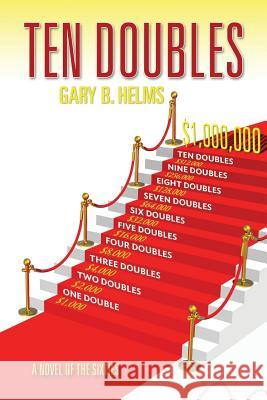Ten Doubles: ANovel of the Sixties » książka
Ten Doubles: ANovel of the Sixties
ISBN-13: 9781484161104 / Angielski / Miękka / 2013 / 308 str.
"Ten Doubles" is the story of a swinging money manager in the go-go years of the nineteen-sixties. Against the backdrop of civil unrest and social upheaval, we follow the career of Garvey Hatch. He is an aspiring "gunslinger," who makes hair-trigger decisions to trade large blocks of stocks in order to out-perform competing mutual funds. Garvey leaves his mark on the ticker tape and the newly-liberated secretarial pool in almost equal measure.With long hair and sideburns, a wide-lapelled and bell-bottomed suit, he will not be mistaken for the so-called money managers in the trust departments. Garvey and his compatriots lived at the epicenter of the birth of modern-day Wall Street: Hedge funds, LBO pools, takeovers and derivatives all sprang from the sixties boom that spawned the gunslingers. Garvey's personal and primary quest is to achieve ten doubles of his meager thousand dollar stake, thereby turning it into a life-altering million. Along the way, he must confront the reality that true love and family are the most important quests of all. After working and scheming] his way through Harvard Business School, Garvey realizes that he is stuck in a bad job choice. He and Lil decide to take their two kids and leave their beloved Atlanta for a securities analyst job with a mutual fund in Kansas City. It is there that his formerly rudderless career takes shape. He vows to achieve a net worth of a million dollars through just ten successive investments that double in value. A lot of stocks had been doubling in a short period of time. A million dollars in the nineteen sixties was serious money. Once achieved, it could be put into low risk corporate bonds where it would produce forty-five to fifty thousand dollars a year for many, many years. This, at a time when new Pontiacs cost thirty-eight hundred dollars loaded, and eighty dollars a week would buy more groceries than a family of four could eat. Garvey aspires to be a growth fund manager, one who acts quickly, so quickly that he is known in the business as a gunslinger. The problem is that gunslingers have to have a record of excellence for about ten years. Garvey arrived last Thursday. He is pretty sure that he can be good at this business. It is, after all, ninety percent common sense and nerve, both of which he has long shown to have in abundance. He does, in fact, love his new-found profession. He flies first class, he stays in first class hotels, and in his first week on the job, went to a Hollywood party unavailable to a mid-level rock star. He has been given a free pass to the sexual revolution, and no longer has to skulk around his neighborhood hustling frustrated housewives. His life has few dull moments. People in the sixties didn't run or go to the gym, and Garvey played neither golf nor tennis. This left plenty of time for drinking, gambling, and chasing the bra-less chicks now utilizing the miraculous Pill. He has no intention of getting emotionally involved with any of his conquests, being what he considers to be very happily married.That resolve, however, becomes sorely tested when he starts seeing "Eleanor Rigby," the office enchantress. Just as Garvey is getting his feet on the ground professionally, his firm is acquired in a leveraged buyout. The new owners are grossly over-extended, and begin to cut deeply into the budget that the Investment Division considers critical to managing the funds. They also intrude into other money management prerogatives that Garvey is unwilling to compromise. He develops a deep and mutual hatred with the acquirer's hatchet man, exactly the person willing and ready to fire him on a whim. Garvey desperately needs a little longer track record before throwing himself on the job market. Suddenly, he is confronted with several moral dilemmas, professional and personal. How he is going to resolve them may be a bit intriguing to those readers who haven't quite yet figured out what kind of man Garvey Hatch
Zawartość książki może nie spełniać oczekiwań – reklamacje nie obejmują treści, która mogła nie być redakcyjnie ani merytorycznie opracowana.











